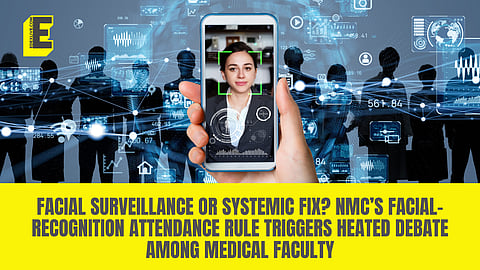

The National Medical Commission’s (NMC) recent directive mandating Facial Recognition System (FRS) and GPS tracking for faculty attendance in medical colleges has triggered a fierce face-off between teachers’ associations, citing privacy violations, and groups arguing it’s a necessary check against widespread malpractice.
The policy, effective from May 1, aims to replace traditional Aadhaar-based fingerprint biometric systems. However, it has been sharply criticised by faculty groups like the Medical Teachers Association of Bundelkhand Medical College, Sagar (Madhya Pradesh), who call it a “digital leash” and “moral policing.”
In a strongly worded letter to the NMC dated April 19, the association wrote:
“Forcing faculty members to share their real-time location is not only unjustified but also offensive. We are professionals, not subjects of suspicion… The NMC is not a moral policing agency,”, calling the system an “unacceptable invasion of privacy.”
The letter added that instead of solving actual issues like “unchecked mushrooming of medical colleges without adequate faculty or infrastructure,” the NMC is busy “micromanaging under the guise of regulation.”
In conversation with EdexLive, Association President Prof Dr Sarvesh Jain minced no words in his criticism of the NMC’s move.
“If everyone is right, then Pegasus should be installed on all our devices. This is not about right or wrong, it’s about privacy, which is a Constitutional right. I may have ‘n’ number of secrets, and as long as I’m within the law, they’re my business,” he said, calling GPS tracking “completely unacceptable.”
Dr Jain further alleged that the NMC is turning into a government instrument:
“Earlier, we had the Medical Council of India (MCI), which was independent. Today, NMC is a body formed and appointed by the government, and is now acting like a surveillance agency.”
On the other side: “System exploited, needs overhaul”
However, not everyone is opposed to the move.
The MSc Medicine Association (TMMA) took to X (formerly Twitter) in support of the reform, citing a recent incident from Andhra Pradesh where 232 healthcare professionals were caught manipulating even the existing facial recognition attendance system by altering date and time settings on their phones.
“Even FRS has proven to be vulnerable at the hands of corrupt and criminal employees,” TMMA posted, adding that employee unions were allegedly lobbying to shield those caught. The association appealed to the Health Minister JP Nadda and the NMC to go ahead with full implementation “in the interest of the Nation.”
In an interview with EdexLive, TMMA President Dr Shashank Kambali explained why such stringent reforms are essential.
“Earlier, teachers used silicone fingerprints to bypass biometric systems. Now, some are tampering with the facial recognition system itself. Everyone from the ministry to medical colleges knows that in many departments, only one or two out of 10 faculty members are actually present, yet records show 100% attendance,” he said.
Dr Kambali did, however, acknowledge the concerns raised by faculty members:
“I’m not outrightly denying the teachers’ opposition. But if the government introduces such systems, they must also provide transparency, explain how it works, address fears, and take feedback. It should not just be enforced top-down.”
He emphasised that the purpose behind introducing such tech-based reforms will be defeated if not backed by regular inspections, proper monitoring, and responsive grievance mechanisms.
The bigger picture: Control vs reform?
At the heart of the clash lies a deeper ideological divide. Critics see the move as yet another instance of bureaucratic overreach and surveillance disguised as reform. Supporters view it as a necessary evil to uphold discipline and tackle rampant manipulation in the medical education system.
One thing is clear: both sides agree that attendance fraud is real. What they disagree on is how far surveillance should go to fix it.
As the implementation date looms, the medical education community waits, caught between technological oversight and Constitutional rights, between reform and resistance.
